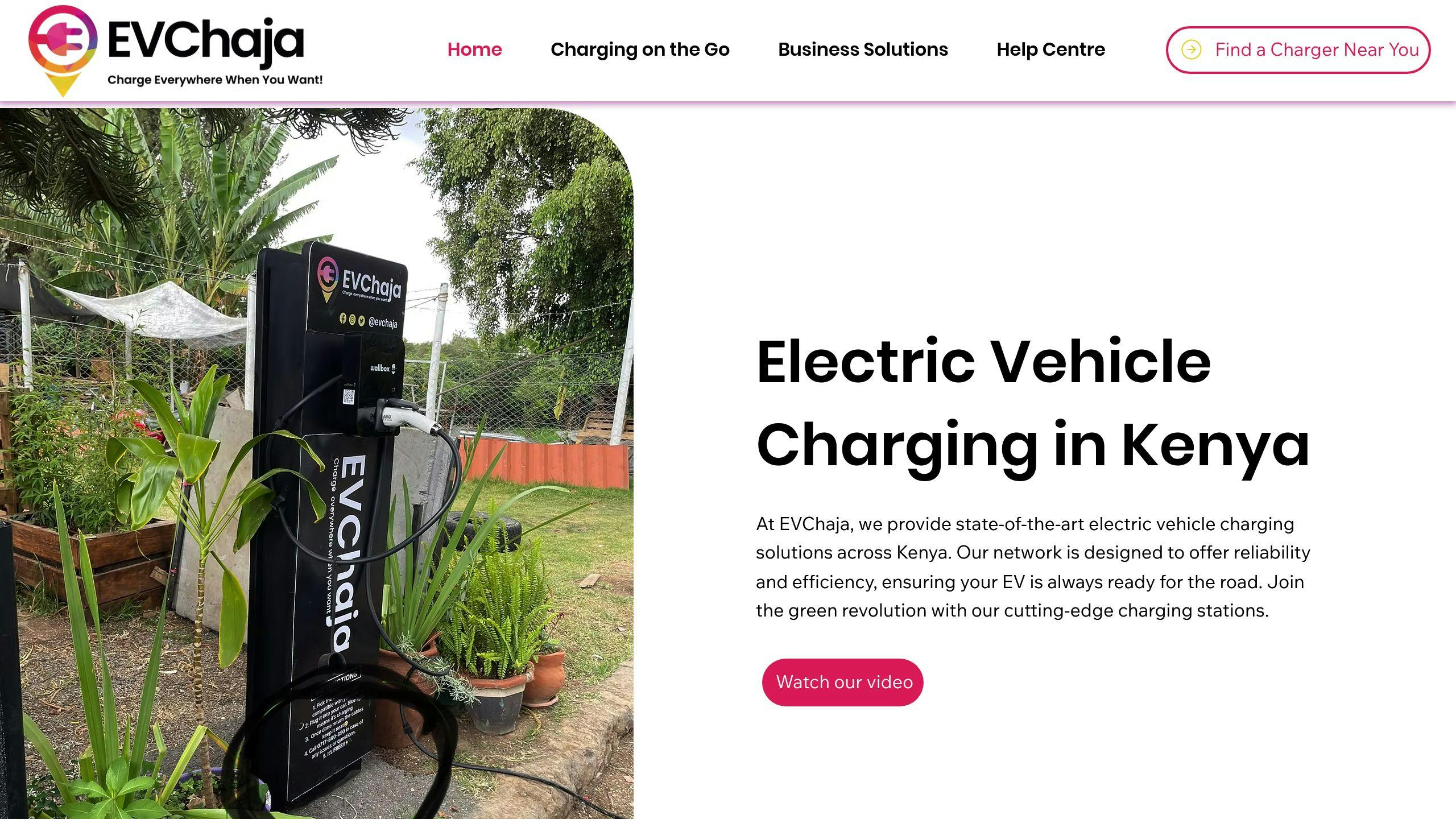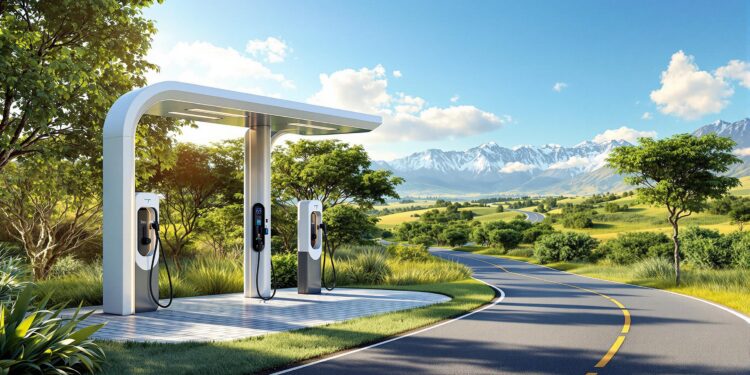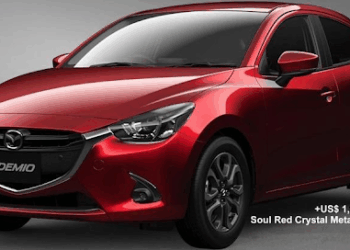Kenya’s electric vehicle (EV) charging network is growing fast. With over 100 charging stations as of July 2024 and 3,753 registered EVs by December 2023, EV adoption is becoming a reality for Kenyan drivers. Here’s what you need to know:
- Charging Costs: Kenya Power offers tiered electricity pricing – KSh 17/kWh during peak hours and KSh 8/kWh off-peak – making EVs cheaper to run compared to petrol vehicles.
- Key Players: Companies like Moja EV Kenya, Electric Avenue Kenya, and TotalEnergies are expanding charging infrastructure nationwide.
- Government Support: New building codes require EV-ready parking spaces, and incentives like time-based electricity pricing encourage adoption.
- Types of Chargers: Public stations mainly feature Level 2 AC chargers, while DC fast chargers (80kW) enable quick charging for long trips.
- Travel Tips: Plan routes along major highways like Nairobi-Mombasa or Nairobi-Kisumu, leveraging fast chargers and off-peak electricity rates to save costs.
Kenya’s EV ecosystem is evolving rapidly, making cross-country travel and urban EV use more practical than ever.
An Introduction To EVChaja: Kenya’s EV Charging Network

Current State of EV Charging in Kenya
Kenya now has over 100 operational EV charging stations as of July 2024 [1]. This rapid growth highlights the country’s push for greener transportation and the rising interest from EV users.
Key Charging Networks and Providers
Kenya’s EV charging sector is seeing strong contributions from several key players. Moja EV Kenya leads the pack with 80kW DC fast chargers that can fully charge vehicles in just 15-30 minutes, a faster alternative to standard AC chargers [1].
Kenya Power has allocated $1.9 million to expand its charging infrastructure and currently offers free charging at its Stima Plaza and Ruaraka depot locations [1].
Other notable providers include:
| Provider | Coverage Areas | Key Features |
|---|---|---|
| Electric Avenue Kenya | Nairobi, Mombasa | Fast chargers and home charging solutions |
| EVBox Kenya | Nairobi, Kisumu, Nakuru | Nationwide network with solar-powered options |
| EVChaja | Multiple cities | Kenya’s first dedicated EV charging network |
| TotalEnergies Marketing Kenya | 13 locations nationwide | Variety of charging options |
"We intend to champion the adoption of e-transport solutions in the country and help the country transition from fossil fuels in powering the motor industry." – Eve Maina, Managing Director, Electric Go Company
Government Support and Programs
The Kenyan government has introduced several measures to boost EV charging infrastructure:
- Building Code Regulations: The National Building Code 2024 mandates that 5% of commercial parking spaces must be equipped for EV charging [1].
- Electricity Pricing Incentives: Kenya Power offers time-based rates to encourage EV adoption:
- Peak hours: KSh17 ($0.13) per unit
- Off-peak hours: KSh9 ($0.07) per unit [3]
These initiatives lay the groundwork for expanding and diversifying EV charging options across the country.
Types of EV Chargers in Kenya
AC and DC Charging Differences
Kenya’s EV charging options include both AC and DC solutions, each suited for specific needs:
| Charger Type | Power Delivery | Typical Use Case |
|---|---|---|
| Level 1 AC | Single-phase, 3-5 miles per hour | Home charging |
| Level 2 AC | Three-phase, 10-20 miles per hour | Public stations, malls |
| DC Fast Charging | 480V, 80% in 30 minutes | Highway corridors |
Level 2 AC chargers make up 61% of public charging stations [1], offering a practical option for those parking overnight or during the workday.
For faster charging, the 80kW DC fast chargers are key to Kenya Power’s development of highway corridor infrastructure, as noted in Section 2. These chargers can bring compatible EVs to 80% charge in just 15-30 minutes [1]. This makes them essential for long-distance trips, which will be discussed further in Section 5.
Compatibility with EV Models
EV models in Kenya are designed to work with specific charging standards and connectors, which align with the infrastructure Kenya Power is rolling out.
For AC charging, Type 2 (Mennekes) connectors are the standard and are widely compatible with European and Asian EVs. On the DC fast charging side, the Combined Charging System (CCS) is becoming the go-to option in most of Kenya’s charging stations.
Here’s a quick look at some popular EVs in Kenya and their supported charging standards:
| Vehicle Model | Supported Standards |
|---|---|
| Tesla Model 3 | Type 2, CCS (with adapter) |
| BYD e6 | Type 2, CCS |
| Hyundai Kona Electric | Type 2, CCS |
These models represent 68% of Kenya’s registered EVs [1]. Charging times for these vehicles depend on factors like battery size and how busy the station is.
Locating and Using EV Charging Stations
Finding Charging Stations
Kenya’s growing EV infrastructure makes it easier for drivers to locate charging stations across the country. EVChaja, Kenya’s first electric vehicle charging network, has a mobile app available for iOS and Android. This app provides real-time updates on charging station availability and lets users track their charging sessions [4].
Here are some platforms that help you find charging points in Kenya:
| Platform | Coverage | Key Feature |
|---|---|---|
| EVChaja App | Nationwide | Real-time updates |
| PlugShare | Major cities | User reviews |
| ChargeMap | Urban areas | Route planning |
Additionally, TotalEnergies Marketing Kenya has partnered with e-mobility companies to set up 13 charging stations across the country [5].
Guide to Charging
To ensure a smooth experience at public charging stations, follow these steps:
Before Charging:
- Check your battery level and confirm the connector type matches your vehicle (refer to Section 3 for standards).
- Park in a spot designated for EVs.
- Have your payment method ready, especially if pre-registration is required.
During Charging:
- Securely connect the charging cable to both your car and the station.
- Start the session using the provider’s app or the station’s interface.
- Monitor the charging progress through the app.
Pricing and Hours: Kenya Power’s tiered pricing applies: Ksh.17 per kWh during the day (6am-10pm) and Ksh.9 per kWh at night (10pm-6am). These rates are crucial to consider when planning longer trips (see Section 5).
For added safety, always use well-lit charging locations.
sbb-itb-e5ed0ed
EV Charging Costs in Kenya
Kenya Power’s tiered pricing model has introduced a clear cost advantage for electric vehicle (EV) users.
Cost Factors and Comparison
Kenya’s EV-specific electricity rates (Ksh.17 during peak hours and Ksh.9 off-peak) are significantly lower than the standard domestic electricity rate of Ksh.27 per kWh [3]. This pricing makes operating an EV far cheaper compared to traditional fuel-powered vehicles.
| Cost Comparison (100km Journey) | Electric Vehicle | Petrol Vehicle |
|---|---|---|
| Energy Consumption | 16.7 kWh | 10 liters |
| Peak Hour Cost | Ksh.284 ($2.00) | Ksh.1,960 ($13.82) |
| Off-Peak Cost | Ksh.150 ($1.06) | N/A |
These cost differences highlight how EVs can reduce travel expenses, especially for long-distance trips. Kenya Power’s infrastructure investments further support this transition, making EV adoption more practical for consumers.
"Looking at the cost of fuel right now in the country compared to the cost of electricity, it makes sense for us to start an EV fleet to save on costs." [3]
Payment Methods
Kenya’s EV charging networks provide several payment options to suit different user needs:
Mobile Money Solutions:
- M-Pesa integration for quick payments and digital receipts.
Card-Based Systems:
- RFID cards and tap-and-go options with credit or debit cards.
For regular users, subscription plans offer perks like peak-hour discounts and priority access. TotalEnergies Marketing Kenya, which operates 13 charging stations nationwide, uses unified payment terminals [5]. Fleet operators, such as Embassava, benefit from corporate payment solutions that simplify billing and provide detailed usage reports, reinforcing the cost-saving benefits of EVs for businesses.
Planning Long-Distance EV Trips in Kenya
Traveling long distances in an EV across Kenya calls for careful planning, especially with the current state of charging infrastructure.
Route Planning with Charging
To save on costs, take advantage of Kenya Power’s tiered pricing, which offers lower rates during off-peak hours (10pm-6am). Plan your stops based on your EV’s range and focus on these major routes:
| Route | Key Charging Stops | Distance |
|---|---|---|
| Nairobi-Mombasa | Voi, Mtito Andei | 485 km |
| Nairobi-Kisumu | Naivasha, Nakuru | 340 km |
| Nairobi-Nanyuki | Thika, Nyeri | 195 km |
Keep in mind that battery efficiency can drop by 20-30% in hilly areas or extreme heat. Also, ensure that charging stations along the way support CCS connectors (refer to Charger Compatibility).
Recommended Routes and Destinations
The Nairobi-Mombasa highway is one of the most convenient routes for EV travelers, thanks to its multiple fast-charging stations. For a comfortable stopover, the Enashipai Resort & Spa in Naivasha provides free charging for guests, making it a great option for long trips.
Here are some EV-friendly destinations to consider:
Naivasha Region
- Offers several charging points
- Located just 120km from Nairobi
- Features solar-powered charging stations
Nakuru National Park
- Charging options available in Nakuru town
- Increasing number of hotel-based charging points
Mount Kenya Circuit
- Charging facilities in Nanyuki
- Useful stops in Thika and Nyeri
For added peace of mind, AA Kenya provides EV-specific roadside assistance, including mobile charging services.
Tip: Schedule your charging sessions during off-peak hours (10pm-6am) to benefit from the Ksh.9/kWh rate for long trips.
Conclusion
Kenya’s EV charging network has reached a point where nationwide travel is now a practical reality due to three major advancements:
First, both public and private sectors have played a crucial role in laying the groundwork for EV adoption. National regulations now require new commercial buildings to include EV charging spaces, while Kenya Power has committed KSh258 million to strengthen the necessary infrastructure.
For drivers, the mix of competitive pricing and growing infrastructure offers real opportunities, as highlighted earlier. The cost benefits make electric mobility an increasingly attractive option for both individuals and businesses in Kenya.
This progress aligns with the country’s broader transportation and environmental goals. With an expanding network of charging stations and ongoing government backing, Kenya is steadily advancing toward a more sustainable future in mobility.
FAQs
How many EVs are there in Kenya?
Kenya’s Energy and Petroleum Regulatory Authority reports that as of December 2023, there were 3,753 electric vehicles (EVs) on the country’s roads, making up 1.62% of all registered vehicles [1]. This represents a staggering 350% increase since April 2023.
For those thinking about making the switch, Kenya’s charging network now supports cross-country travel, as highlighted in our route planning section.
This growth is fueled by key factors like Kenya Power’s investments in infrastructure, updated building codes requiring EV-ready parking spaces, and incentives for off-peak charging.
The government has set a bold goal to surpass 200,000 EVs by 2025, pushing for EVs to make up over 5% of all registered vehicles [2]. Support for this target includes tiered electricity pricing and mandatory charging infrastructure, as discussed earlier.
Urban areas are seeing faster adoption rates, thanks to expanding charging networks. Several providers now offer coverage across the country, as detailed in Section 2.
Related Blog Posts
- Essential Car Maintenance Checklist for Rainy Season
- 7 Tips for Rainy Season Car Care in Kenya
- Ultimate Guide to Off-Road Safety in Kenya
- Car Loan Eligibility in Kenya: Key Factors




